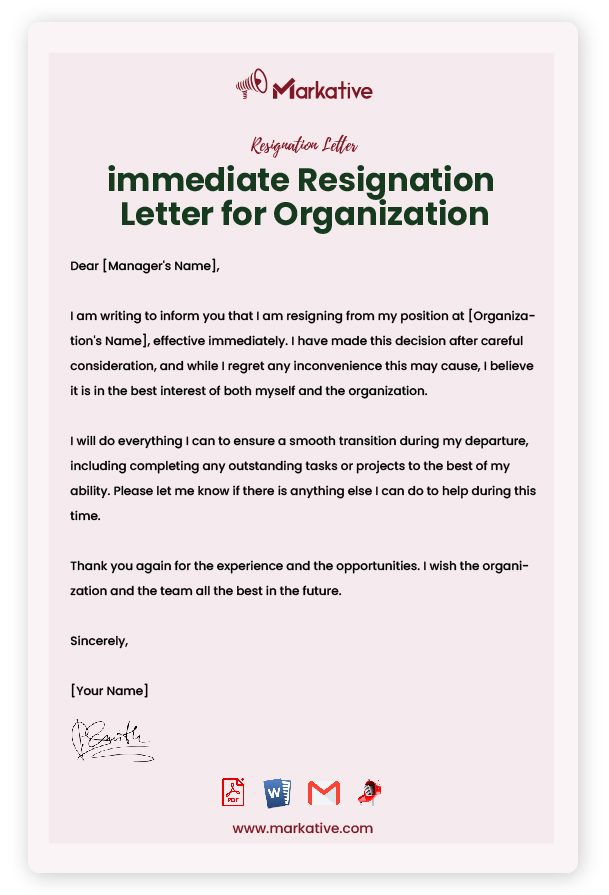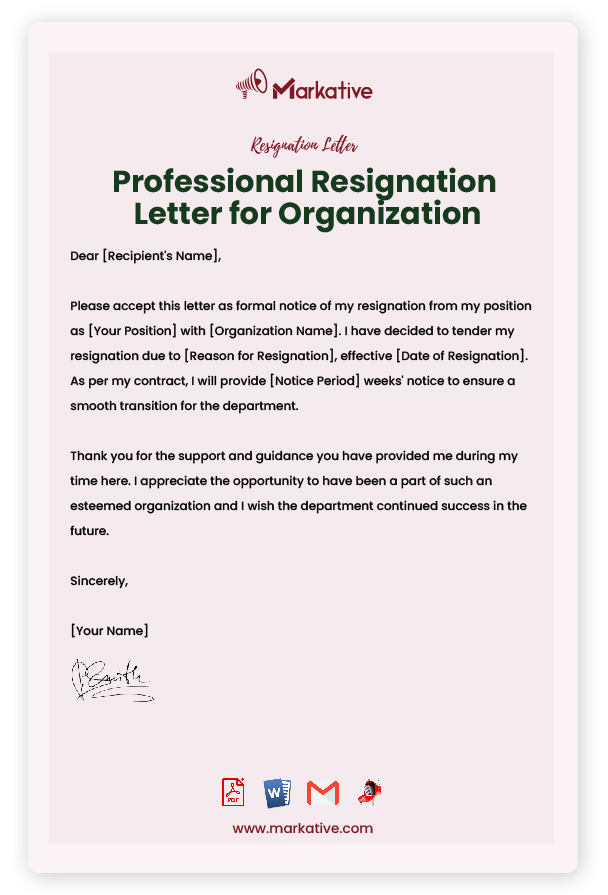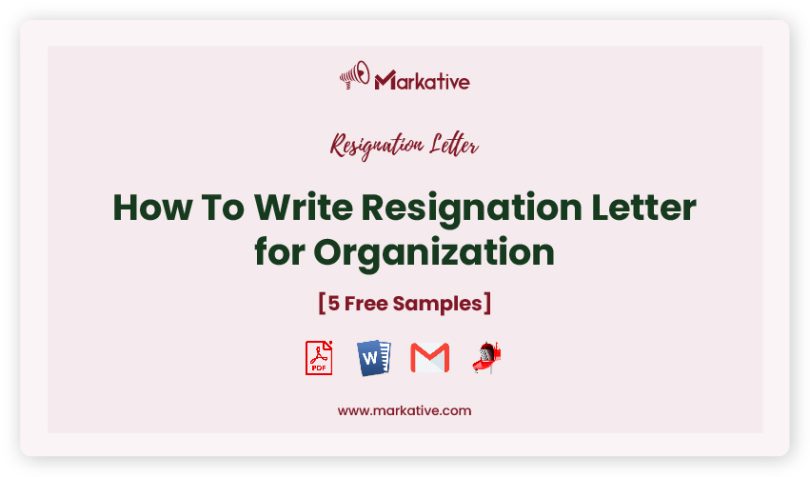Resignation is an inevitable part of professional life, and at some point, everyone may need to write a resignation letter. A resignation letter is a formal communication that informs the employer of an individual’s intention to leave the organization. Although resignation is a tough decision, a well-written resignation letter is an essential tool to maintain professionalism and leave a positive impression on colleagues and the organization.
A good resignation letter can make a significant impact on an individual’s professional reputation and future career prospects. It is essential to craft a resignation letter with care and consideration, outlining the reasons for leaving and expressing gratitude towards the employer and colleagues. The letter should also provide details about the last day of work and offer assistance during the transition period. By leaving a positive and professional impression, individuals can maintain their professional networks and leave the door open for future opportunities.
In this article, we will discuss the importance of resignation letters, the elements of a good Resignation Letter for Organization, and the best practices to follow when resigning from an organization. Whether you are resigning due to personal reasons or career growth opportunities, this article will guide you through the process and help you create a resignation letter that showcases your professionalism and leaves a positive impact on your employer and colleagues.
5 Steps To Write Appealing Resignation Letter for Organization ?
When resigning from an organization, it is important to write a clear and professional resignation letter that leaves a positive impression. Here are 5 steps to help you write an appealing resignation letter:
- Step 1: Address the letter to your supervisor or HR department and include the date of your resignation. Example: “Dear [Supervisor’s Name], I am writing to inform you that I will be resigning from my position as [Your Position] at [Company Name], effective [Date of Resignation].”
- Step 2: Express gratitude for the opportunity and mention positive experiences during your time at the company. Example: “I would like to take this opportunity to thank you and the entire team at [Company Name] for providing me with valuable experience and opportunities for growth during my time here.”
- Step 3: State the reason for your resignation in a concise and professional manner. Example: “After much consideration, I have decided to pursue a new opportunity that aligns more closely with my career goals.”
- Step 4: Offer to assist with the transition and provide a timeline for completing any outstanding work. Example: “I am committed to ensuring a smooth transition and will work diligently to complete any outstanding tasks before my departure. Please let me know how I can assist in the handover process.”
- Step 5: Close the letter with a positive statement and your contact information. Example: “I am grateful for the experience and opportunities I have had at [Company Name] and wish the organization continued success. Please feel free to contact me if there is anything else I can do to support the transition. Thank you again for your understanding and support during this process.”
Writing a professional resignation letter can be challenging, but following these steps can help you create a positive and effective message. Remember to keep the tone polite and positive, as you never know when you may need to work with your former colleagues or supervisor in the future.

immediate Resignation Letter for Organization
Dear [Manager's Name], I am writing to inform you that I am resigning from my position at [Organization's Name], effective immediately. I have made this decision after careful consideration, and while I regret any inconvenience this may cause, I believe it is in the best interest of both myself and the organization. I want to express my gratitude to you and the rest of the team for the opportunities and experiences I have had during my time at [Organization's Name]. I have learned a great deal, and I am grateful for the support and guidance I have received along the way. I will do everything I can to ensure a smooth transition during my departure, including completing any outstanding tasks or projects to the best of my ability. Please let me know if there is anything else I can do to help during this time. Thank you again for the experience and the opportunities. I wish the organization and the team all the best in the future. Sincerely, [Your Name]
Professional Resignation Letter for Organization
[Your Name] [Your Address] [City, State ZIP Code] [Your Email] [Date] [Manager's Name] [Manager's Title] [Organization Name] [Organization Address] [City, State ZIP Code] Dear [Manager's Name], I am writing to inform you of my resignation from my position as [Your Position] at [Organization Name], effective [Date of Resignation]. I have thoroughly enjoyed my time at the organization, and it is with a heavy heart that I have decided to move on. I would like to take this opportunity to thank you and the entire team at [Organization Name] for the support and guidance provided to me during my time here. It has been a privilege to work with such a dedicated and talented group of individuals, and I have learned so much from each of you. To ensure a smooth transition, I am willing to assist in any way possible to complete any ongoing projects before my departure. Please let me know how I can be of assistance during this time. I will do my best to ensure that all of my work is completed and that any outstanding tasks are delegated appropriately to other team members. I will also ensure that any necessary documentation is left in order for my successor to take over my responsibilities with ease. Thank you again for the wonderful opportunity to be a part of such a fantastic organization. I appreciate everything that I have learned and the experiences I have had while working here. Please let me know if there is anything else I can do to assist with this transition. Sincerely, [Your Name]
Resignation Letter for Organization with Reason
Dear [Manager's Name], I am writing to inform you of my decision to resign from my position as [Job Title] at [Company Name]. My last day of work will be [Date]. I have thoroughly enjoyed my time working at [Company Name] and appreciate the opportunities that have been presented to me during my tenure here. However, after careful consideration, I have decided to move on to pursue other career goals. I would like to take this opportunity to thank you and the entire team for the support and guidance you have provided me throughout my time at the company. I have learned a great deal and will carry these experiences with me as I move forward in my career. Please let me know if there is anything I can do to ensure a smooth transition during my remaining time here. I am committed to ensuring that all of my outstanding projects are completed and that any loose ends are tied up before my departure. Once again, I thank you and the entire team for your understanding and support during this time. Sincerely, [Your Name]
Urgent Resignation Letter for Organization Sample
[Your Name] [Your Address] [City, State ZIP Code] [Your Email Address] [Date] [Recipient's Name] [Organization Name] [Address] [City, State ZIP Code] Dear [Recipient's Name], I regret to inform you that I am submitting my resignation from my position as [Your Job Title] effective immediately. I have enjoyed my time here at [Organization Name] and have learned a lot during my time here. Unfortunately, circumstances have arisen that make it necessary for me to resign from my position. I have been offered an opportunity that I cannot pass up, and I feel that it is in my best interest to pursue this opportunity. I want to thank you for the opportunities and experiences that [Organization Name] has provided me during my time here. I appreciate the support and guidance that I have received from my colleagues and supervisors. I will make sure to complete all my current projects and will do everything possible to ensure a smooth transition during this time of departure. If there are any specific tasks or projects that you would like me to complete before my last day, please let me know. I will ensure that my responsibilities are transferred to my successor and I will provide any necessary information to make the transition as seamless as possible. Thank you again for the opportunity to work with such a great organization. I wish you and [Organization Name] all the best in your future endeavors. Sincerely, [Your Name]
Simple Resignation Letter for Organization
[Your Name] [Your Address] [City, State ZIP Code] [Your Phone Number] [Your Email Address] [Date] [Manager's Name] [Manager's Title] [Organization Name] [Organization Address] [City, State ZIP Code] Dear [Manager's Name], I am writing to inform you that I am resigning from my position as [Your Job Title] at [Organization Name], effective [Date of Resignation]. I have decided to move on to pursue other opportunities that align more closely with my personal and professional goals. I would like to express my sincere gratitude to you and the entire organization for the support and opportunities you have provided during my time here. It has been a privilege to work with such a dedicated team, and I have learned a great deal from my colleagues and superiors. In the coming weeks, I will do everything I can to ensure a smooth transition of my responsibilities. Please let me know how I can be of assistance during this process. Thank you again for everything, and I wish the organization continued success in the future. Sincerely, [Your Name]
How Much Notice Should You Give for a Resignation Letter for Organization?
According to a recent survey by the Society for Human Resource Management, the average notice period for professional positions in the United States is two weeks. However, the notice period can vary depending on the industry, company policy, and the employee’s role within the organization. Some companies may require a longer notice period, such as 30 or 60 days, for higher-level positions or those with specialized skills. On the other hand, some companies may accept a shorter notice period for entry-level or temporary positions.
It is essential to check the employment contract or company handbook for specific guidelines on how much notice to give when resigning. It is also best to speak with your supervisor or HR representative to discuss the appropriate notice period and ensure a smooth transition. Giving sufficient notice not only helps the organization plan for your departure but also demonstrates professionalism and respect for your colleagues and the organization as a whole. Ultimately, the amount of notice you give should be determined by your individual circumstances and the company’s policies.
Is it Ok To Email a Resignation Letter for Organization?
Yes, it is generally acceptable to email a resignation letter to an organization, especially if it is standard practice within the company or if you work remotely. However, it’s always best to check with your supervisor or HR department to ensure that email is an acceptable method for submitting your resignation. When emailing your resignation letter, make sure to address it to the appropriate person or department, be clear and concise about your intention to resign, and express gratitude for the opportunity to work with the organization. For example,
"Dear [Supervisor's Name], I am writing to inform you of my resignation from my position as [Job Title] at [Company Name], effective [Resignation Date]. I appreciate the opportunities I have been given during my time here and wish the company continued success in the future."

Common Mistakes When Writing a Resignation Letter for Organization?
Certainly, here are three common mistakes to avoid when writing a resignation letter for an organization:
- Not Giving Enough Notice: It’s important to give your organization enough notice when resigning. Generally, two weeks is standard, but check your employment contract to see if there are any specific requirements. Failing to give enough notice can reflect poorly on you and may harm your professional reputation.
- Being Too Negative: It’s best to keep your resignation letter professional and positive. Avoid criticizing your employer or colleagues, even if you have had negative experiences. Remember, you may need a reference from them in the future.
- Not Expressing Gratitude: Even if you are leaving the organization because of negative experiences, it’s important to express gratitude in your resignation letter. Thank your employer for the opportunities they have given you and the skills you have acquired while working there. This will help maintain positive relationships and leave a good impression.
Conclusion:
writing a resignation letter is an essential aspect of leaving any organization. It is crucial to send your resignation letter in a timely manner and to the right person. Some common mistakes to avoid include being negative or overly emotional, providing too much detail, and failing to express gratitude. We hope that the templates we have provided will help make the process of writing a resignation letter more manageable. Remember, a well-written resignation letter can help maintain positive relationships with former colleagues and employers and pave the way for future opportunities. Good luck in your future endeavors!







